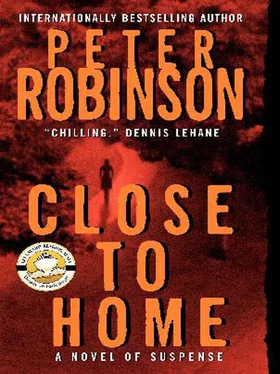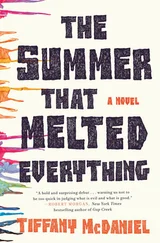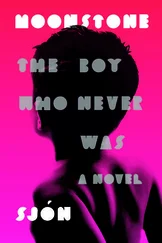Michelle was eating warmed-up chicken casserole, sipping a glass of sauvignon blanc and watching a television documentary on ocean life when her telephone rang late that evening. She was irritated by the interruption, but thinking it might be Banks, she answered it.
“Hope I didn’t disturb you,” Banks said.
“No, not at all,” Michelle lied, putting her half-eaten food aside and turning down the volume with the remote control. “It’s good to hear from you.” And it was.
“Look, it’s a bit late, and I’ve had a few drinks,” he said, “so I’d probably better not drop by tonight.”
“You men. You take a girl to bed once, and then it’s back to your mates and your beer.”
“I didn’t say I’d had too much to drink,” Banks replied. “In fact, I think I’ll phone for a taxi right now.”
Michelle laughed. “It’s all right. I’m only teasing. Believe me, I could do with an early night. Besides, you’ll only get in trouble with your mother. Did you find out anything from your old pals?”
“A bit.” Banks told her about Bradford’s “Dirty Don” epithet and the rumors they used to hear about the Mandeville house.
“I’ve heard of that place recently,” Michelle said. “I don’t know if Shaw mentioned it, or if I read about it in some old file, but I’ll check up on it tomorrow. Who’d have thought it? A house of sin. In Peterborough.”
“Well, I suppose, strictly speaking, it’s outside the city limits,” said Banks. “But going by the photo I found in Graham’s guitar and the information you got from Jet Harris’s ex-wife, I think we’d better look into anything even remotely linked with illicit sex around the time of Graham’s murder, don’t you?”
“That’s it!” Michelle said. “The connection.”
“What connection?”
“The Mandeville house. It was something to do with illicit sex. At least it was illicit back then. Homosexuality. There was a complaint about goings-on at the Mandeville house. I read about it in the old logs. No further action taken.”
“Tomorrow might turn into a busy day, then,” said Banks.
“All the more reason to get an early night. Can you stick around to help, or do you have to head back up north?”
“One more day won’t do any harm.”
“Good. Why don’t you come to dinner tomorrow?”
“Your place?”
“Yes. If I can tempt you away from your mates in the boozer, that is.”
“You don’t have to offer dinner to do that.”
“Believe it or not, I’m quite a good cook if I put my mind to it.”
“I don’t doubt it for a moment. Just one question.”
“Yes?”
“I thought you told me you hadn’t seen Chinatown .”
Michelle laughed. “I remember saying no such thing. Good night.” And she hung up, still laughing. She noticed the photo of Ted and Melissa from the corner of her eye and felt a little surge of guilt. But it soon passed, and she felt that unfamiliar lightness again, a buoyancy of spirit. She was tired, but before calling it a night, she went into the kitchen, pulled out a box of books and flipped through them before putting them on her shelves. Poetry for the most part. She loved poetry. Including Philip Larkin. Then she hefted out a boxful of her best china and kitchenware. Looking around at the mostly empty cabinets, she tried to choose the best place for each item.
All the way to Swainsdale Hall Annie worried about what she was going to say to the Armitages. Their son had lived a good part of his life unknown to them, mixed with people they didn’t know and wouldn’t approve of, especially Martin. But don’t all kids? Annie had grown up in an artists’ commune near St. Ives, and some of the people she had mixed with would have made Martin Armitage’s hair stand on end. Even so, she hadn’t told her father about the wild group she took up with one summer, whose idea of fun was a Saturday-afternoon shoplifting expedition in town.
The view over Swainsdale looked gloomy that morning in the low cloud and impending rain, dull gradations of gray and green. Even the patches of yellow rapeseed on the far hillsides looked jaundiced. As Annie rang the doorbell, she felt a surge of anxiety at the thought of seeing Martin Armitage again. It was foolish, she knew; he wasn’t going to assault her – not in front of his wife – but she still had an aching jaw, two loose teeth and an upcoming dentist’s appointment by which to remember their last meeting.
Josie opened the door and the dog sniffed Annie’s crotch as she walked in. Josie collared it and took it away. Only Robin Armitage sat on the large living room sofa in jeans and a navy-blue top, flipping through a copy of Vogue . Annie breathed a sigh of relief. Maybe Martin was out. She’d have to talk to him, but a little procrastination wouldn’t do any harm. Robin wore no makeup and seemed to have grown older since Luke’s death. She looked as if a strong gust of wind would blow her away. She stood up when Annie entered, gave her a thin smile and bade her sit down. She asked Josie to bring in some coffee.
“Is your husband not home?” Annie asked.
“He’s in his study. I’ll ask Josie to send for him when she brings the coffee. Are you making any progress?”
“Some,” said Annie. “That’s why I wanted to talk to you both again, ask you a few questions.”
“Are you all right? Your mouth still looks bruised.”
Annie put her hand up to her jaw. “I’m fine.”
“I’m really sorry for what happened. I know Martin is absolutely guilt-stricken.” She managed a weak smile. “It’ll take him all his courage to come down and face you again.”
“No hard feelings,” Annie said, which wasn’t exactly the truth, but there was no point taking it out on Robin.
Josie came in with the coffee and digestive biscuits on a tray and Robin asked her to call Mr. Armitage down. When he walked into the living room a couple of minutes later, Annie felt a wave of panic. It passed, but it left her heart pounding and her mouth dry. This was ridiculous, she told herself, but her body couldn’t help but respond that way to whatever aura of violence Martin Armitage emanated. It just seemed closer to the surface in him than in most people.
Naturally, he was contrite and embarrassed. “Please accept my apologies,” he said. “I don’t know what came over me. I’ve never laid a finger on a woman before.” Robin patted his knee.
“It’s all right,” said Annie, eager to move on.
“Of course, if there are any medical expenses…”
“Don’t worry about it.”
“How’s Mr. Wells?”
Annie had talked with the hospital and discovered that, while Norman Wells’s physical injuries were healing well, the psychological damage went a lot deeper. He seemed, they said, to be suffering from depression. He couldn’t sleep, but he didn’t want to get out of bed, had no interest in food and seemed unconcerned about his future. Hardly surprising, Annie thought, given what the poor sod had been through over the past week or so. And now the newspapers had got hold of the story, there’d be no more bookshop for Wells. Once everyone knew what he had been accused of, nobody would go down there, or if they did, it would only be to cause damage. Norman Wells would become a pariah.
“He’ll be fine,” Annie said. “Actually, I have a few more questions for the both of you.”
“I can’t imagine what more we can tell you,” said Robin. “But please go ahead.”
“First of all, do either you or your husband have a prescription for Valium or any other form of diazepam?”
Robin frowned. “Martin doesn’t, but I do. Nerves.”
“Have you noticed any missing lately?”
Читать дальше












